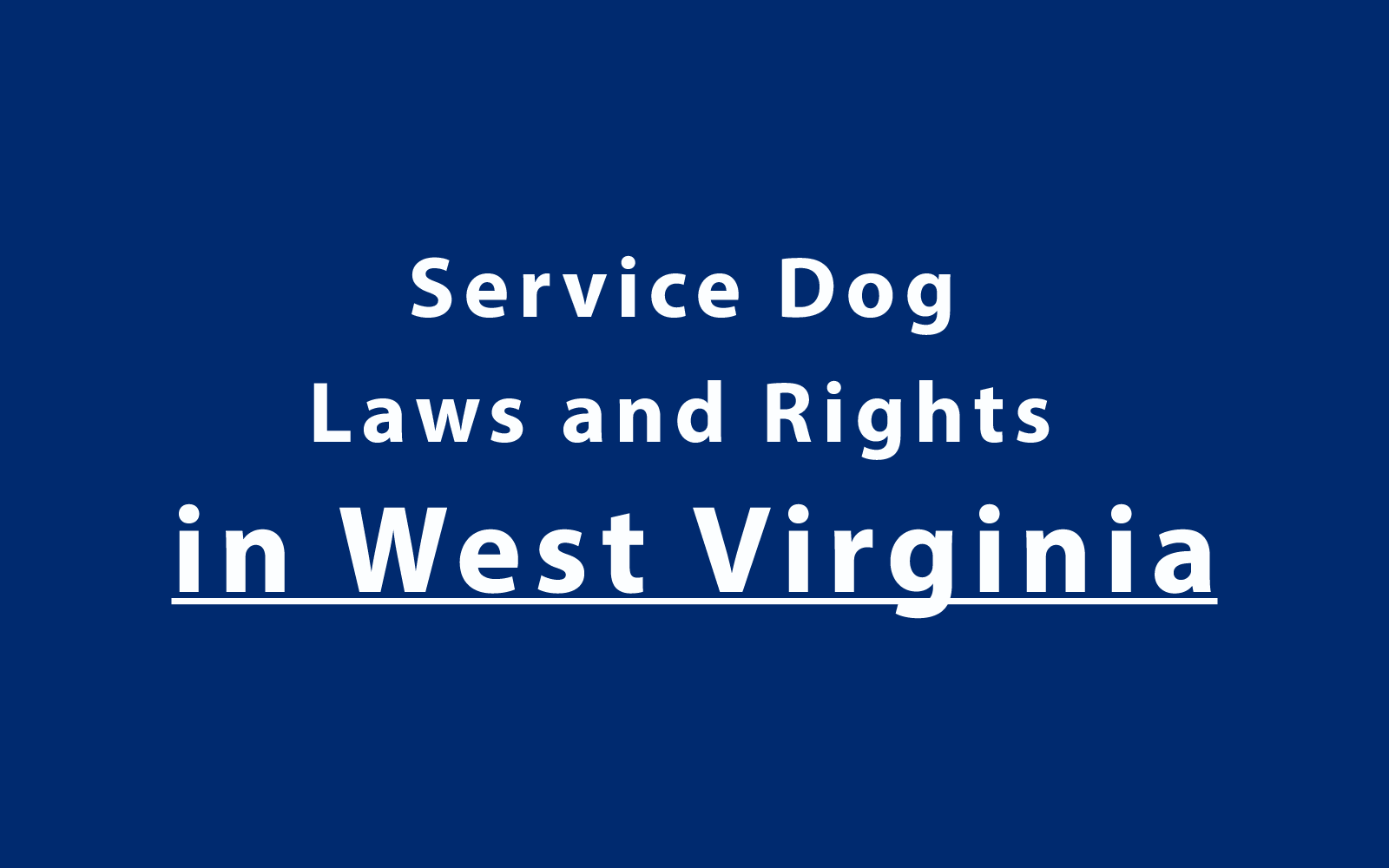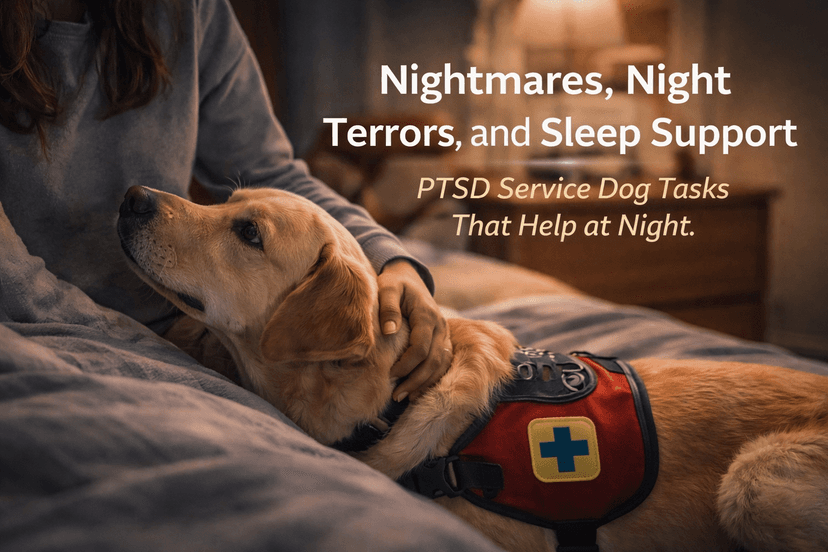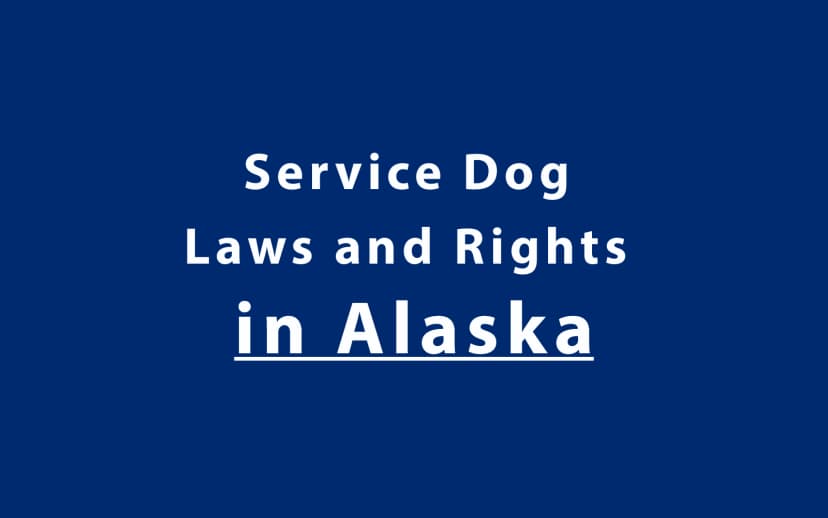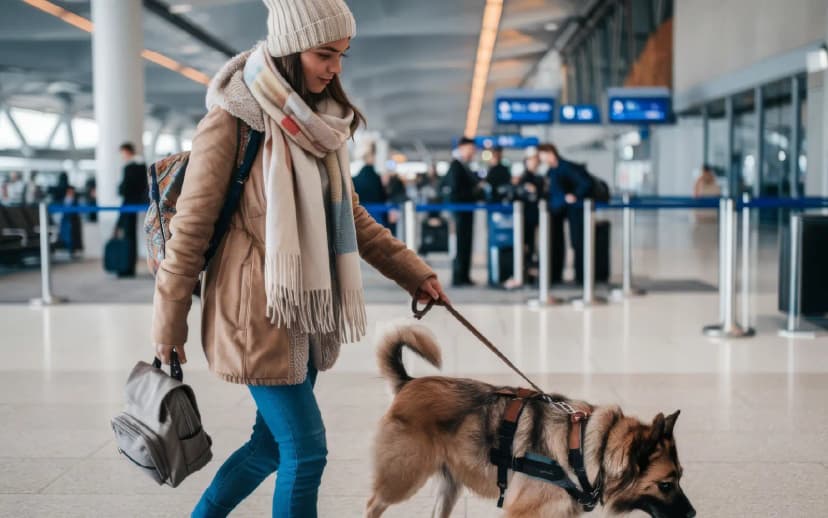Service Dog Laws and Rights in West Virginia

Service dogs are a vital part of independence and daily function for individuals with physical, sensory, psychiatric, and neurological disabilities. In West Virginia, these animals are protected under both federal and state laws that guarantee their access to public spaces, housing, education, employment, and transportation. This guide outlines service dog laws and rights in West Virginia as of 2025, helping handlers and the public understand legal responsibilities and protections.
What Qualifies as a Service Dog in West Virginia
Under the Americans with Disabilities Act (ADA) and West Virginia Code § 5-11-9, a service dog is defined as a dog that is individually trained to perform specific tasks or work for a person with a disability.
Examples of qualifying tasks include:
• Guiding individuals who are blind or visually impaired
• Alerting individuals who are deaf or hard of hearing
• Pulling a wheelchair or assisting with mobility
• Detecting oncoming medical conditions (e.g., seizures, blood sugar changes)
• Interrupting psychiatric episodes, including PTSD, anxiety, and panic attacks
What is not considered a service dog:
• Emotional Support Animals (ESAs), which provide comfort but do not perform specific trained tasks
• Therapy animals used in institutional or group settings
• Companion pets not trained to assist with disabilities
Only dogs are recognized under the ADA as service animals, and they must be task-trained. In West Virginia, service dogs in training may be granted access to public places under certain circumstances.
Public Access Rights in West Virginia
Service dog handlers in West Virginia are protected by the ADA and state public accommodation laws. These laws allow individuals with service animals to enter and use all spaces where the public is allowed.
Examples of covered public places include:
• Restaurants and food establishments
• Shopping malls and retail stores
• Libraries and museums
• Public parks and recreational areas
• Hospitals and medical clinics
• Government buildings and courthouses
Permitted questions by staff:
1. Is the dog required because of a disability?
2. What work or task is the dog trained to perform?
Staff may NOT:
• Demand documentation or ID
• Ask the handler to demonstrate tasks
• Inquire about the nature of the disability
Service dogs must be leashed, harnessed, or otherwise under control. If a service dog is acting aggressively, is not housebroken, or is disruptive, a business may request its removal—but not the removal of the handler.
Housing Rights in West Virginia
The Fair Housing Act (FHA) applies to West Virginia residents and ensures that service dog handlers and ESA users are protected in rental housing.
Housing protections include:
• Right to live with a service animal or ESA, regardless of “no pets” policies
• No pet fees or additional deposits can be charged for the animal
• No breed, size, or weight limitations may be applied to service animals
When documentation is allowed:
• If the need is not obvious, landlords may ask for a letter from a licensed healthcare provider verifying the disability and the need for the animal
• They may NOT request medical records, training documents, or registration papers
Tenants who face discrimination may file complaints with HUD or the West Virginia Human Rights Commission.
Employment Rights
The ADA Title I and the West Virginia Human Rights Act protect employees who use service dogs as a reasonable accommodation in the workplace.
Requesting accommodation involves:
• Submitting a formal request to the employer or HR department
• Providing documentation only if the need is not obvious
• Engaging in an interactive process to determine reasonable accommodations
Employers may only deny the request if:
• The service dog would pose a safety threat
• The accommodation would impose an undue hardship on business operations
Employees who experience discrimination may file a complaint with the Equal Employment Opportunity Commission (EEOC) or the WV Human Rights Commission.
Travel & Transportation
Air Travel (ACAA)
Under the Air Carrier Access Act, trained service dogs are allowed to fly in the cabin with their handler free of charge.
Airlines may require:
• Submission of the DOT Service Animal Air Transportation Form, verifying that the dog is trained, well-behaved, and healthy
Ground Transportation (ADA)
Service dogs must be accepted on:
• Buses, trains, and public transit
• Ride-sharing services (Uber, Lyft)
• Taxis and airport shuttles
If access is denied, handlers can file a complaint with the U.S. Department of Transportation or the West Virginia Division of Public Transit.
Service Dogs in Education
K-12 Schools
Under the ADA and Individuals with Disabilities Education Act (IDEA), students may bring service dogs to public schools.
Schools must:
• Allow access to all areas where students are permitted
• Not charge additional fees for the service dog’s presence
• Not require documentation or registration
Schools may ask who will handle the dog’s needs during the school day and ensure the animal does not interfere with learning.
Colleges and Universities
Post-secondary institutions must allow service dogs in classrooms, dormitories, dining halls, and common spaces. Students are encouraged to register with Disability Services offices to coordinate accommodations.
Training & Registration in West Virginia
West Virginia does not require service dogs to be registered, certified, or wear identifying vests. While some handlers choose to use IDs or vests, these are not legally required.
Training requirements:
• Dogs must be trained to perform tasks related to a disability
• Handlers may self-train their service dog or use a professional trainer
Recommended best practices:
• Complete a Public Access Test (PAT)
• Practice in real-world environments
• Use optional identifiers (vests or ID cards) to reduce access issues
AssistanceDogPartners.org offers online training, PAT certification, and optional ID kits for handlers based in West Virginia.
Fraud & Misrepresentation
It is a violation of West Virginia law to misrepresent a pet as a service animal. Fraud undermines legitimate service dog teams and can result in legal consequences.
Penalties for misrepresentation may include:
• Civil fines
• Denial of public access
• Potential misdemeanor charges in certain cases
Examples of fraud include:
• Using a fake vest or ID
• Claiming an ESA or untrained pet is a service dog
• Falsely asserting public access rights
Violations can be reported to local authorities or the WV Human Rights Commission.
State & Local Resources
• West Virginia Human Rights Commission – Housing, employment, and access discrimination
• Disability Rights West Virginia – Advocacy and legal aid
• WV Division of Rehabilitation Services – Employment and disability support
• AssistanceDogPartners.org – Service dog training, ID kits, and certification programs
Frequently Asked Questions (FAQs)
1. Do I need to register my service dog in West Virginia?
No. Registration is optional, not mandatory.
2. Are psychiatric service dogs protected under law?
Yes. As long as they are task-trained, they are covered under the ADA.
3. Can landlords or HOAs deny my service dog?
No. The FHA prohibits such discrimination unless the animal is dangerous or disruptive.
4. Can I train my own service dog?
Yes. Owner-training is legal in West Virginia and the U.S.
5. What should I do if a business denies me entry with my dog?
File a complaint with the DOJ or the WV Human Rights Commission.
Conclusion
West Virginia supports a wide range of legal protections for service dog users in public, private, and educational settings. While no registration or certification is legally required, handlers should ensure their dogs are task-trained, well-behaved, and under control at all times. Using optional training resources, like those at AssistanceDogPartners.org, can provide structure, confidence, and smoother access experiences.
By understanding and asserting your rights responsibly, you help build a more inclusive and respectful environment for all individuals with disabilities and their service animals.



